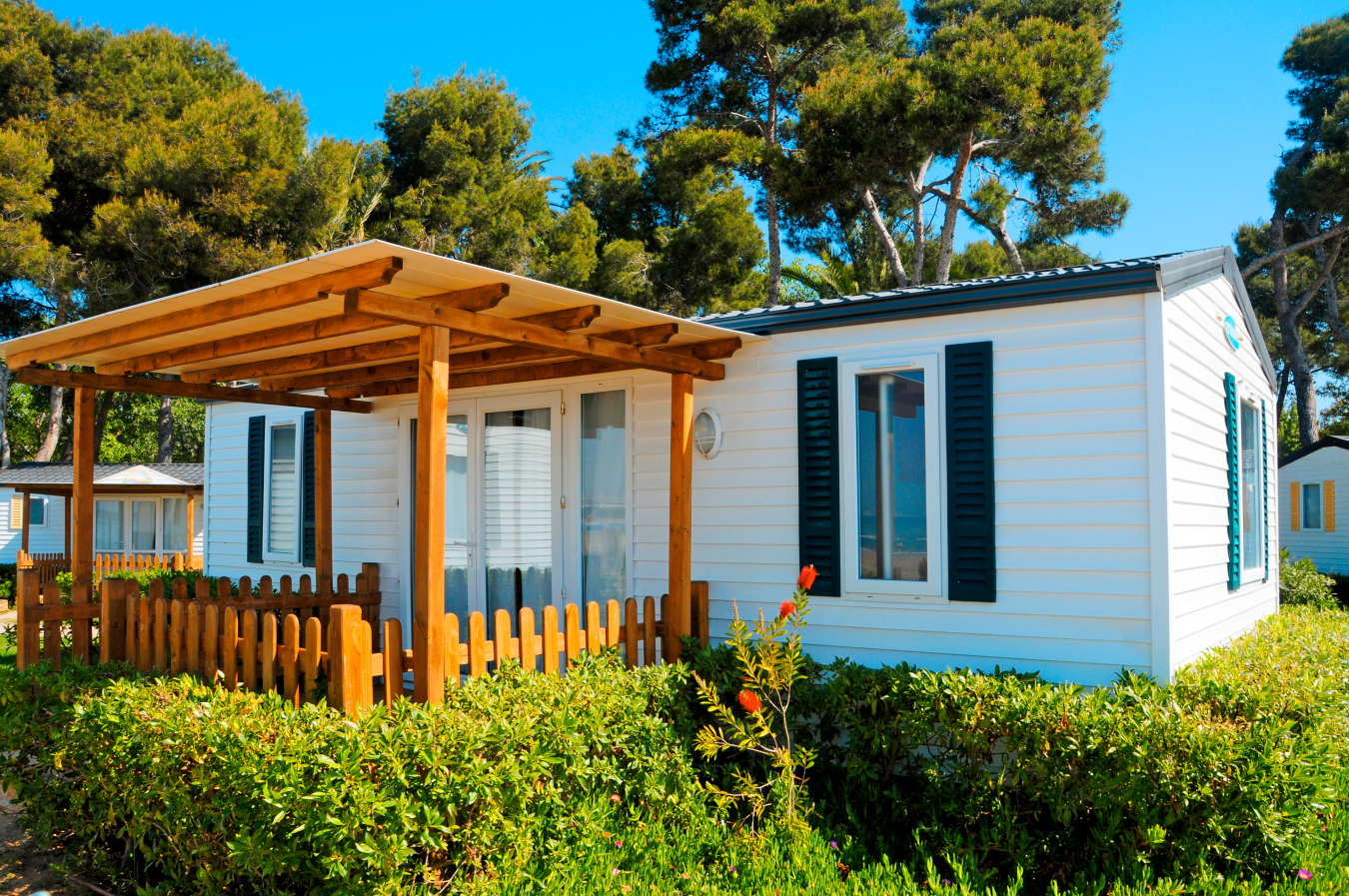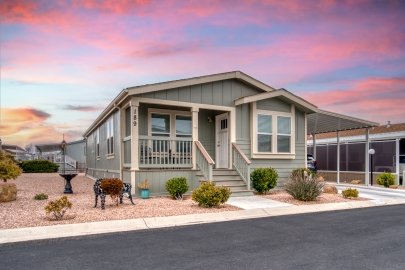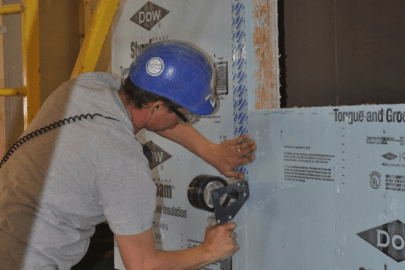
Today’s energy-efficient manufactured homes offer a housing option that is affordable, comfortable, and resilient. Manufactured homes are available in a wide variety of designs and floorplans similar to site-built homes. Consumers can choose among many energy-efficient equipment options and features, including high-efficiency heating and cooling systems and ENERGY STAR® appliances. Consumers can also choose manufactured homes that are ENERGY STAR certified, which provides even lower utility bills and greater comfort. If you’re interested in making your current manufactured home more efficient, visit the DOE Energy Saver website for helpful tips and resources on how to make your home more efficient, or contact your utility service provider to learn about programs and incentives that may be available to you.
The resources on this website can help you understand available options for selecting and financing the purchase of your new home. You can also find information on how to improve the energy efficiency of an older home and information on utility, state or local incentives and financial assistance that may be available.
Purchasing one of today’s manufactured homes can be a smart choice when looking for a newly built modern and energy-efficient home at an affordable price and monthly housing payment. There are a range of financing and ownership options to consider, including loan programs offered by federal agencies. Your state or local housing agency may have additional financing options, including down payment assistance and low-interest loans for income-eligible borrowers. The process for purchasing, financing, and owning a manufactured home may involve different decisions and financing options than those you’d encounter when buying a site-built home, but it doesn’t have to be difficult. See the resources page for additional information for borrowers or those currently living in manufactured homes.
Affordable Options
Although many buyers arrange financing through the manufactured home retailer where they purchase their home, it makes sense to evaluate the range of options available to you. Many banks and credit unions provide loans and financing plans for prospective owners. Manufactured homes may also be eligible for government-insured loans offered by the Federal Housing Administration (FHA), the Veterans Administration (VA), and the Rural Housing Services (RHS) under the U.S. Department of Agriculture (USDA). Some lending institutions also offer conventional mortgages or other loan options where manufactured homes are titled as real property.
The type of financing you can get will depend on whether you own or rent the land on which your home will be installed. If you live in or will be moving to a resident-owned community, you will have additional resources and protections that can help keep homeownership affordable. As with any large purchase, it makes sense to research your options.
If you will, or already do, own the land then your home may be classified as real estate – also referred to as “real property” – and you could apply for a conventional or government-backed mortgage. These loans work almost exactly the same as financing for traditional “site-built” houses and are typically the lowest cost of financing.
While these more traditional loans are generally your lowest cost option, not all borrowers are eligible for all loans. Some loans offered through mortgage lenders are bought and guaranteed by Fannie Mae and Freddie Mac. To qualify for these loans, borrowers typically need to meet certain credit criteria, but may be able to purchase a home with as little as 3 percent down. FHA-insured loans, offered through FHA-approved lenders, work the same way whether you’re purchasing a manufactured or traditional home. The minimum required down payment is 3.5 percent if your FICO score is 580 or higher, and 10 percent if it’s between 500 and 579. Purchase or renovation of existing manufactured homes can also be financed, if the home was built after June 15, 1976. The home must be permanently installed on an approved foundation and cannot be located in a flood zone.
If you are a service member or veteran, you may qualify for the VA loan program for manufactured homes that are titled as real property. These require 5 percent down, and the loan terms range from 20 years up to a maximum of 25 years (loan terms may vary by lender and type of home). VA also offers an energy-efficient mortgage loan option to help finance energy-efficiency improvements to manufactured homes by adding the cost of improvements to a mortgage loan, up to a maximum amount of $6,000.
If your property is in a rural-designated area, USDA Rural Housing loans are another option, with loan programs to assist low- and moderate-income homebuyers. These require no down payment, but the manufactured home must be new and you must have a credit score of at least 650 and meet income-eligibility guidelines (you need to make less than 115% of the county’s median income).
To learn more about improving your credit score and other information about preparing for homeownership and what type of mortgage loan program is right for you, contact a HUD-certified housing counselor in your area.
If you only plan to own the home and not the underlying land (for example, you rent a lot from a park or community), or if you prefer to borrow only on the home itself, then your manufactured home is considered personal property, and you must finance it with a special type of loan known as a "chattel loan." Chattel loans, sometimes referred to as personal property loans, are for the home only and differ from mortgage loans in several ways. The loan amount is usually smaller because you’re not buying the land. The repayment periods are shorter – typically 20 years – which means that monthly costs may be higher than you’d like, but you’ll own the home quicker than with a 30-year mortgage. Perhaps most importantly, chattel loans typically come with higher rates and more stringent terms. That said, they can still be a solid option for buyers who need to buy a manufactured home without land, or who choose to not mortgage their land when financing a manufactured home.
Chattel loans are often offered by the manufactured home retailer – or from a list of lenders recommended by the retailer – but other banks and credit unions may also provide you financing for your home. FHA-insured loans are available both as mortgages and as personal property loans and can be a good option for many homebuyers, including individuals who may not qualify for loans from commercial banks.
In a few instances, you may be able to qualify for a mortgage even if don’t own the underlying land. If you will live in a community that can offer the option of titling a manufactured home as real property, you may be eligible for a mortgage and thus get more favorable terms. This legal structure exists in a few states such as New Hampshire but may soon be available elsewhere.
In a resident-owned community (ROC), homeowners form a nonprofit business called a cooperative. Each household is a member of the cooperative, which owns the land and manages the business that is the community. Members continue to own their own homes individually and an equal share of the land beneath the entire neighborhood. There are many benefits to living in a ROC, including:
- Control of monthly lot rent, community repairs, and improvements
- Lifetime security against unfair eviction
- Liability protection (members are not personally liable for association loans)
- A strong sense of community
Everyone has a say in the way the ROC is run, and major decisions are made by democratic vote. Members elect a board of directors, which appoints committees to carry out various tasks and manage the day-to-day operations of the organization.
These differ from commercially owned communities where another owner controls the lot rent, the rules, and condition of the community. In a resident-owned manufactured home community, if you don’t like how it is being managed, you can run for a position on the board of directors and make improvements inside the organization. The ROC USA organization can help you learn more about these communities and the process for purchasing a community as a resident-owned cooperative.
You may qualify for incentives or assistance when purchasing your manufactured home. Some states and utilities offer rebates or other incentives for purchase of energy-efficient manufactured homes, or energy-efficiency improvements to existing homes. For additional information on federal, state and utility incentives, visit the ENERGY STAR rebate finder, or the Database of State Incentives for Renewables and Efficiency (DSIRE).
Examples of incentives available from states and utilities are highlighted below:
- Appalachian Power offers a $700 rebate to its customers in Virginia that purchase an ENERGY STAR manufactured home
- Efficiency Vermont offers a mobile home replacement program that provides income-based incentives and assistance for replacing existing mobile homes with a zero-energy modular home
- Maine State Housing Authority offers a low-interest loan and grant program for replacement of pre-1976 manufactured homes with an ENERGY STAR-certified manufactured home
- Energy Trust of Oregon offers cash incentives for purchasing an energy-efficient manufactured home
- South Carolina Energy Office offers ENERGY STAR manufactured home rebate and tax incentives
- Umatilla Electric Cooperative (Oregon) offers rebates and low-interest loans for energy-efficiency improvements to existing manufactured homes, and a manufactured home replacement program (including a forgivable loan and direct assistance) for eligible low-income households
Also, just as first-time homeowners may be able to get assistance for down payment or closing costs, some programs also offer this for manufactured homes. For example, borrowers can use Next Step’s Down Payment Seeker™ to find programs that help bring down the costs – either upfront or monthly – for your manufactured home purchase. See the resources section for additional information and resources.


